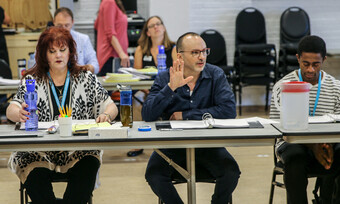The Artist, the Institution, and the Communal Organism
Let’s start: successful theaters are linked, inseparably with their communities. The link is complex and intangible. The theater does not exist to cultivate its own growth solely with a blind hope that it is “good for” the community or with an “if you build it, they will come” mentality. Frankly, the institution cannot become an entity to itself. It must be a place where both artist and audience are equally treated to a unique and necessary experience or people will go elsewhere—the movies, the houses of worship, the amusement parks—where they do get a unique and necessary experience.
These idealistic pronouncements are incited by a keynote address delivered by Todd London at the No Passport Conference in New York City in March 2013. In his talk, London explores and encourages the development of a unique relationship between artist and institution. He eschews some current realities of the American theater: the institutionalized language and interactions, the seeming self-interest of artists and artistic institutions. Everything great, he implicitly claims, is the result of an artist’s unique, individual strengths and interests partnered with the trust of an institution. He doesn’t fear the density of the matter and ventures into multiple layers of discourse for which I applaud him. I do not wish to criticize or categorize his argument, and I certainly do not intend to oversimplify his thorough and nervy address. In fact, I agree with him nearly point for point and I encourage you to take in his point of view. I do think, however, that he fails to mention a vitally important element of the American theater. And so, I am extending his argument to include what is, to me, the most crucial, least disposable element of growth for American theater today. In the diet of artistic consumption it is, in my view, the protein for both artist and audience; it is the building block on which the potential for growth is infinite and unforeseeable.
My maturation as a young theater practitioner has nothing to do with finding and knowing the answers. I don’t know them. Trust me. It has everything to do with facing the pivotal question: of which American theater do I want to be a part? The answer is that I will only, and can only, be a part of the theater that evolves through the specific and indispensable relationship with its community. And my so-called maturation has nothing to do with figuring it out and everything to do with allowing myself to figure it out as it happens.
Part of “figuring it out” is allowing myself to look to the past and the future for inspiration and valuable tools while living in the absolute and unbending present—with this community of artists and audience. Of course, every community and time period is by nature different, so there are no hard and fast rules for how to live now. Unfortunately, it is impossible to simply open your heart and expect the puzzle piece of the community’s needs to perfectly, serendipitously fit the hole inside your artistic soul. Instead you will match your needs against the needs of the community and while they may not match perfectly from the start, you will shape and mold them into a mutually symbiotic shape over time. The shape will have many sides and angles but it will serve both parties in a unique and necessary way. The by-product of this steady pressure is that it creates a push-pull relationship between the artists, the art they create as well as the art they choose to preserve, and the audience. The pressure will strain from end to end like a circus bear balancing on a beach ball—one paw presses while the other lets off, back and forth—or else risk becoming too rigid, losing its center of gravity, and tumbling to the ground.
The only path to discovery and relevance as an artistic community is allowing our ideas and needs to evolve in conjunction with and stimulated by the community we serve. (As a rebuttal to any doubts regarding acquiescence to the will of the audience I refer you to London’s discussion of “excellence” that incited this response.) As London states, “Take a tip from the apples: in art as in botany, monoculture leads to decline; biodiversity and cross-pollination are necessary for our survival.” If you have your finger on the pulse of a living, breathing communal organism, you will never run out of things to say or action to take. Simply, community innately provides biodiversity.
As a resident company member of the Barter Theatre in Abingdon, Virginia, I take part in this push-pull relationship professionally. From a groundling’s perspective, I have witnessed the micro failures and successes that are part of serving a living thing: the tiny pushes and pulls that are ugly, unpredictable, and made in real time—in the present. The relationships expand out as an infinite web—from artistic director to resident actor, to playwright, director, designer, technician, season ticket holder, donor, tourist—then to a countless number of unidentified relationships making the organism complex and nearly unfathomable. And yet, here in the theater’s eighty-first consecutive year, I am confidently instilled with the belief that a community is not limited to the labels of good, bad, sophisticated, low-brow, or any verbal approximation. Just like a human life, it has a characteristic shape, speed, set of habits, diseases, antibodies, and relations. The community will serve and support the institution that operates within it, as a part of the whole.
And so, the big statements from before become a part of the dialogue. They are not the end result because no one knows what that is until the moment it occurs; you can only know that in the present. But as London aptly states, “The way we make theater is as important as what we make.” Extend the scope to include the pulse—the needs, desires, secrets, and truths—of the community. Then, irrelevance becomes impossible. Each moment will be full, multi-dimensional, unprecedented, and necessary. And in the end, the artist, institution, and audience will grow.












Comments
The article is just the start of the conversation—we want to know what you think about this subject, too! HowlRound is a space for knowledge-sharing, and we welcome spirited, thoughtful, and on-topic dialogue. Find our full comments policy here
As a young Artistic Director in St. Louis, let me say, "thank you." This article hits it right on the money and sheds light in all the right places. It was amazing how quickly I learned that our community wasn't shy in letting us know what they wanted to see represented on stage. The trick was finding out how to listen to our community/audience. We recently broke our attendance records with a play from a local playwright that focused on Crohn's Disease. We had people who never saw a production with us before coming to see our show because they were trying to gain perspective on the subject for various reasons. (And I'm not trying to boil down your point to: theaters need 'message plays' for their communities. It just blew me away that there was such a demand, not only for awareness of a specific subject, but a demand for a theatrical presentation/avenue for a specific subject.) I quote Todd London quite frequently, but I'll probably quote "Extend the scope to include the pulse… of the community. Then, irrelevance becomes impossible" now too. :-)
As my former teacher John Bergman used to say, "Before you do anything. You must ask the question: Who is your audience?"
This concept harkens back to the early storytellers of primitive tribes who would gather the community around the fires and tell or even retell the great tales that built their common history and forged who they are as a people. That storyteller was an integral part of who those people were. Without him/her their past dies out and they are lost as a culture and a people forever doomed to walk in circles never progressing. These early communities understood the value their storytellers for they shared an intimate relationship with them and held them in great esteem for what they brought to their communal life. A stranger might appear and tell a new tale to tickle their ears with news of strange and far away places, and it would be exciting, but it wouldn't be long before they yearned for the knowledgeable storyteller from their own culture who brought a depth of understanding of their identity as a people that no stranger could approach. If we as the theatre community wish to serve an integral role within our respective communities, a role that binds us to their hearts and makes us relevant in their lives, we must be knowledgeable of our community, their lives, their history, and their vision. What made them who they are as a body of people. Without that, we are a flash and then burn out. They grow weary and look somewhere else to remember themselves. Then we fade away.